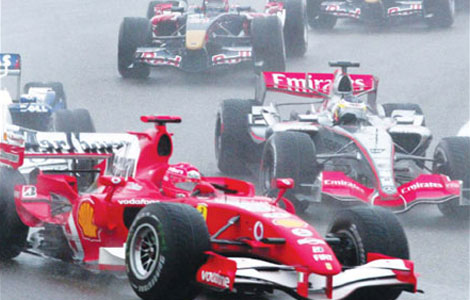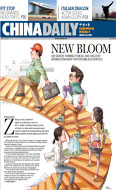Economy
Inflation a threat to sustained Asian recovery
Updated: 2011-04-06 10:23
(Agencies)
MANILA - Asia's emerging economies are spearheading a global recovery and the challenge for policymakers is to normalise policy to head off inflation and overheating, the Asian Development Bank said on Wednesday.
Developing Asia, a diverse group of economies including China, India, Azerbaijan, Thailand and Fiji, is expected to grow 7.8 percent in 2011 and 7.7 percent in 2012, robust rates albeit slower than the 9 percent seen in 2010.
Risks to growth included soft job and housing markets in the United States, Europe's debt problems, the economic impact of last month's massive earthquake in Japan and rising commodity prices, which are being stoked by upheavals in North Africa and the Middle East.
"The region's outlook, however, is for continued strong growth in 2011- 2012, but with the threat of inflation looming closer," the ADB said in its Asian Development Outlook report.
"When weighing their macroeconomic policy choices, many of developing Asia's policy makers see that the balance has tipped toward avoiding overheating."
The ADB, which said its report was generally based on data available up to March 16, said the impact of Japan's disaster was hard to quantify, but was likely to be temporary and limited.
"This benign baseline scenario assumes no major aftershocks, extended power shortages, or massive radiation leaks from the Fukushima plant."
The ADB said there were two important challenges for Asia to sustain growth that would cut poverty: the need to tackle rising inflation and foster new sources of growth.
"High and volatile oil and food prices will in particular reverberate through the world economy, and they are likely to stay that way in 2011-2012. They will thus be a significant source of global inflation, especially in developing countries where recovery is firmly under way."
Asia's strong recovery from the global financial crisis has seen its central banks raise interest rates to try to stem inflationary pressures. On Tuesday, China raised interest rates for the fourth time since October. See [ID:nL3E7F51LX]
South-South ties -- links between the developing countries of Asia, Africa, Latin America and the Middle East -- were developing, the ADB said, and could potentially create an alternative growth engine to reliance on the developed world.
The share of world merchandise trade among countries in the South more than doubled in less than two decades, from 7 percent in 1990 to 17 percent in 2009, the ADB said.
INFLATION A POVERTY RISK
A surge in inflation, particularly food price inflation, could pull down those who are currently just above the poverty line, making it a social as well as economic concern.
The report said recent estimates showed a 10 percent rise in domestic food prices would raise the number of poor in developing Asia by about 64 million, or more than 7 percent.
"High inflation is a direct threat to stable and inclusive growth since rising domestic prices can lead to social tensions," the ADB said.
But tackling inflation driven by global and supply-side factors can put policymakers in a difficult position.
Steps such as tariff cuts and export bans have varying success, and there could also be problems with infrastructure or domestic supply chains that exacerbate price pressures.
Raising interest rates can attract more foreign inflows, which adds to pressure from currencies to appreciate and creates greater liquidity in domestic money supply, creating further difficulties.
Allowing currencies to appreciate was effective when dealing with a sustained surge of inflows, but could cause problems if the inflows are temporary, the ADB said.
"Unfortunately, distinguishing between permanent and temporary capital inflows is difficult, so countries will have to decide on the nature of problem while taking the necessary actions."
E-paper

Green light
F1 sponsors expect lucrative returns from Shanghai pit stop
Buying into the romance
Born to fly
Light of hope
Specials

Share your China stories!
Foreign readers are invited to share your China stories.

No more Mr. Bad Guy
Italian actor plans to smash ‘foreign devil’ myth and become the first white kungfu star made in China.

Art auctions
China accounted for 33% of global fine art sales.
